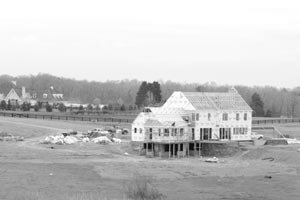>> Back to The HooK front page
COVER SIDEBAR- House poor: Are prices about to plunge?
Published April 14, 2005 in issue 0415 of The Hook

BY DAVID R. FRANCIS / THE CHRISTIAN SCIENCE MONITOR
Economist Dean Baker was so worried about a housing bubble that he sold his Washington, D.C., condominium-- at three times the price he paid for it-- and rented an apartment instead. Now, about two years later, he's still waiting for the bubble to pop.
The danger of a bust is "absolutely getting worse," says Baker, co-director of the Center for Economic and Policy Research in Washington.
A bear market in housing would chew up home values, take a big bite out of commercial banks, and depress consumption, perhaps causing a recession, he and some other economists warn.
So far, the bubble-- if it is that-- has simply stopped growing as fast. The Office of Federal Housing Enterprise Oversight reported last month that the average house price in the United States in the last quarter of 2004 rose just 1.69 percent, down from an exceptionally large appreciation of 4.79 percent in the third quarter. Also, rental prices have been falling for 18 months.
Optimists predict that, rather than popping suddenly, the housing market will see a further slowdown in rising prices, or maybe a small decline.
"Housing is not overvalued," says Joel Prakken, an economist at Macroeconomic Advisers in St. Louis, looking at the entire nation. But, he adds, in certain markets, house prices may be high.
Pessimists anticipate a damaging, perhaps frightening, drop in home prices at some unknown future time. Baker, by the way, talked in 1997 of a stock market bubble-- three years early.
"Bubbles can keep inflating as long as there's cheap credit," says Paul Kasriel, an economist at Northern Trust Co. in Chicago. His concern is that the Federal Reserve will push up interest rates so much that financing a house purchase or taking out a home-equity loan will become prohibitively costly for many Americans.
On average, the interest rate on a 30-year, fixed-rate mortgage stands today just above 6 percent, approximately half a percentage point higher than the rate a year ago. But the Fed last month raised a key short-term rate, the federal funds rate, to 2.75 percent. And Wall Street anticipates this rate going gradually to between three and five percent in the months ahead, largely depending on what happens to inflation in the nation.
"The warning has been sounded," Kasriel says. Among the signs:
* The fastest growing component of the earning assets of banks is home-equity loans-- loans homeowners take out against the value of their homes, with their houses put up as collateral for the loans. Last December, these loans amounted to $399 billion, up $118 billion from a year earlier.
* Banks are making more "piggyback loans." Major buyers of home mortgages, such as Fannie Mae and Freddie Mac, generally require a down payment by the buyer of at least 20 percent of the home's value. Buyers lacking that big a down payment can borrow money to cover the down payment and even the costs of the transaction, taking out separate insurance to cover the extra loan. In 2004, 42 percent of mortgage assignations had piggyback loans, twice the proportion of 2003.
* One in four houses sold last year were bought by investors looking to rent the homes.
* More houses are being bought with adjustable-rate mortgages. The interest rate on these loans can be jacked up if long-term interest rates rise, perhaps after five years, perhaps in fewer years.
* Cash-out refinancing by homeowners last year took a net $325 billion in equity out of their homes.
"It's almost like a house is an ATM machine," Kasriel says. He sees some likenesses to the Florida land boom of 1924-25, which ended in a terrible bust.
Housing is a crucial component of the nation's economy. Over the past 50 years, housing expenditures have made up more than a fifth of the nation's gross domestic product-- that's total spending on goods and services. Housing provides a living not just for homebuilders, but for real estate agents, mortgage providers, lawyers, hardware stores, and so on.
Further, rising home prices have tended to equalize wealth in recent years. They're the chief assets of low- and middle-income people; so when they go up, these groups benefit. The well-to-do, more dependent on equities, saw their wealth fall when the stock-market bubble burst.
Housing booms end not with a bang but a whimper, says Karl Case, a Wellesley College economist. Houses can't be sold in minutes; it takes days and weeks. Homeowners think they know the value of their homes and often don't sell if they don't get that price. So prices are sticky.
Eric Belsky, an expert at the Joint Center for Housing Studies at Harvard University, notes that in the past 10 years, house prices have risen faster than household income in only a quarter of the 153 larger metropolitan areas in the nation-- a good sign for housing prices. Nothing in the immediate horizon indicates housing prices will be hammered, he says.
Contrariwise, Baker sees a major gap between new home construction of about 2 million a year and new home demand of 1.3 million to 1.4 million, with the difference becoming rental units or vacancies.
Though more optimistic, Case admits: "It could turn into a bust."
Belsky says, "It's unchartered waters."
This story originally appeared in the Christian Science Monitor.

daisies in spring br>PHOTO BY JEN FARIELLO
#
PULL QUOTES:
Economist Dean Baker, who sold his D.C. condo two years ago and began renting, talked in 1997 of a stock market bubble-- three years early.
"It's almost like a house is an ATM machine," says economist Paul Kasriel, who sees some likenesses to the Florida land boom of 1924-25, which ended in a terrible bust.
#
>> Back to The HooK front page
|